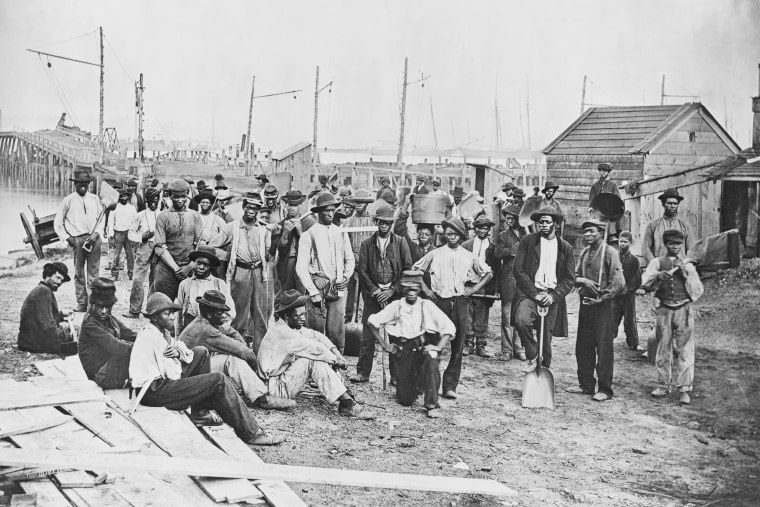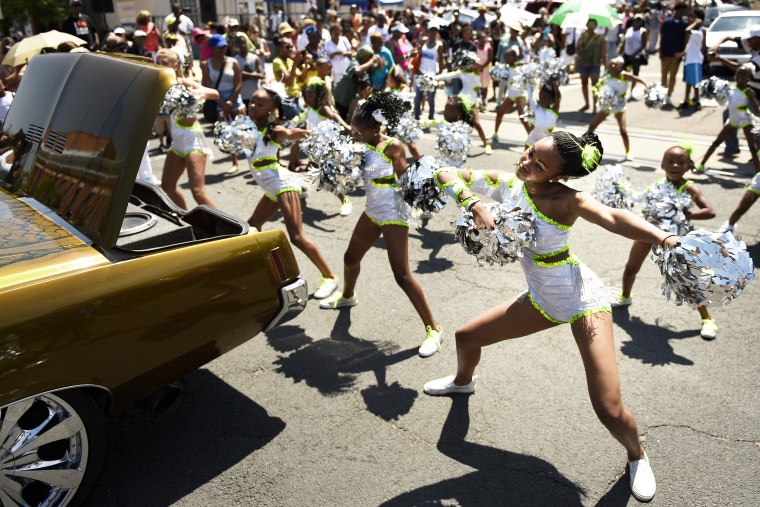Juneteenth, the commemoration of the end of slavery in the United States, will be celebrated by Black Americans this Friday amid a national reckoning on race prompted by the police killing of George Floyd and the sweeping demonstrations that followed.
As hundreds of thousands have protested nationwide and calls for police reform and for an examination of the nation’s history of racial inequality have grown — including rising pressure to take down Confederate statues — some have said that June 19 should be recognized as a national holiday.
President Donald Trump was criticized recently for deciding to hold a public rally on Friday in Tulsa, Oklahoma, site of one of the worst outbreaks of racial violence in American history, in 1921, when a racist white mob killed hundreds of Black residents. Trump later changed the rally to Saturday, June 20.
As June 19 approaches, here’s what you need to know about the holiday.
What is Juneteenth?
On June 19, 1865, Gen. Gordon Granger arrived with Union soldiers in Galveston, Texas, and announced to enslaved Africans Americans that the Civil War had ended and they were free — more than two years after President Abraham Lincoln’s Emancipation Proclamation.
At the time Lincoln issued the proclamation, there were minimal Union troops in Texas to enforce it, according to Juneteenth.com. But with the surrender of Confederate Gen. Robert E. Lee two months earlier and the arrival of Granger’s troops, the Union forces were now strong enough to enforce the proclamation.
The holiday, which gets its named from the combination of June and Nineteenth, is also known as Emancipation Day, Juneteenth Independence Day and Black Independence Day.
“Juneteenth has always been particularly special for African Americans,” said Julian Hayter, a historian and an associate professor at the University of Richmond in Virginia. “It’s this critical inflection point in the Black freedom struggle.”
Even after the Confederate surrender and Juneteenth, slavery still existed in parts of the country until Congress passed the 13th Amendment, which was ratified in Dec. 1865, formally abolishing slavery in the United States.

How is Juneteenth celebrated?
Juneteenth celebrations are held in most states, if not all, Cliff Robinson, the founder of Juneteenth.com, said.
Especially in the South, these celebrations traditionally involve events such as picnics, rodeos, religious components like church ceremonies, and education and historical services for children, he said.
In the last 15 to 20 years, more companies are celebrating it, too, he added.
“There are all kinds of Juneteenth celebrations that take place across Black communities in the United States,” Hayter, the historian, said.
Robinson urged those celebrating Juneteenth this year to take the ongoing public health threat of the coronavirus seriously by wearing masks and practicing social distancing and hand-washing.
Why was Trump’s decision to hold a rally on Juneteenth criticized?
The president received scathing backlash over a decision to hold a campaign rally on Juneteenth in Tulsa, with critics calling it disrespectful and racist.
On Friday night, he tweeted that the rally would be moved a day.
"Many of my African American friends and supporters have reached out to suggest that we consider changing the date out of respect for this Holiday, and in observance of this important occasion and all that it represents," the president wrote in part.
In the 1921 massacre, whites looted and destroyed Tulsa's Greenwood District, known for its affluent Black community, according to the Tulsa Historical Society and Museum.
Historians now believe that as many as 300 Black people were killed, according to the museum.
“This was a systematic annihilation of a thriving Black community,” Hayter said.
Hayter said Trump's decision to have the rally in Tulsa on Juneteenth and near the anniversary of the race massacre caused many people to see it “as a dog whistle, not to conservatives, but to white supremacists.”
“If it was a coincidence, it’s extremely clumsy," he said. "The implications are just as bad if it was a coincidence, because it means he’s completely ignorant of history."
In response, Trump’s campaign manager defended Trump’s “solid record of success for Black Americans.”
In an interview with Fox News, Trump said that the rally had not purposefully been set for Juneteenth, that it was an interesting date “but you can think about it as a celebration.”
Could Juneteenth become a national holiday?
Nearly all states recognize Juneteenth with some limited special status, but there have been calls over the years to make it a national holiday, Robinson, the Juneteenth.com founder, said.
This year, the National Football League and companies such as Nike and Twitter recognized Juneteenth as a company holiday, a move Robinson said was a sign of the changing times.
“I think that's a real take on the way things are transpiring now, a different way of doing things,” he said. “For many, many years there’s been a push for a national holiday, which hasn't taken root yet but this is an interesting way to do the same thing.”
Robinson said he has seen far more attention on his website this year, and more companies have reached out to him asking for speakers to provide virtual educational seminars on the significance of the holiday.
Hayter said the holiday this year “may hold more significance for a lot of people because of the social unrest and racial upheaval that’s taking place."
But that many Americans were not aware of the holiday until recently is part of the problem, Hayter added.
“The fact that many Americans don’t know what Juneteenth is is exactly why we’re at this space right now," he said. "This is seen as an addendum to American history, these are footnotes, yet they’re critical turning points for the country as a whole."
If the protests and societal reforms currently being called for lead to lasting change, Juneteenth could perhaps take on more national prominence, Hayter said.
“If the things that are happening right now have any significance, I think it might be the first time where people recognize the importance of this holiday outside the African American community and more as an American point of reflection,” he said.

